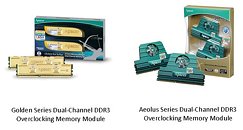Friday, October 2nd 2009
Apacer Announces DDR3 Golden and Aeolus Overclocking Memory Modules
In response to Intel's recent official release of its latest quad-core processors Core i7-800 series and Core i5-700 series, Apacer Technology Inc., the leading memory module manufacturer, unveils two DDR3 dual-channel overclocking memory modules-Golden and Aeolus series. They target desktop and overclocking users to by delivering extreme performance and fully support Core i7 and Core i5 processors that use Intel's Nehalem microarchitecture for optimum platform compatibility for mainstream desktop computers. Excellent overclocking performance thus comes realized.
To support P55 chipset-based Intel Core i7 and Core i5 platforms, Apacer's new DDR3 overclocking memory modules can be powered by 1.65V low voltage supply. When running under the dual-channel mode, Golden series can achieve bandwidth up to 1800 MHz. Aeolus series featuring unique Dual-layer Heat Spreader can reduce the temperature by as much as 20°C and also support maximum frequency of 2200 MHz. Exclusively designed for hardcore gamers and overclocking users, the overclocking memory modules allow users to experience the extreme overclocking performance.In addition to the extreme speed and ultra low voltage, both of the two DDR3 dual-channel overclocking memory modules support Intel's latest XMP (Extreme Memory Profiles). The chipset will automatically read the memory module's SPD (Serial Presence Detect) and then automatically perform overclocking, enabling the user to experience all the excitement and power that overclocking has to offer.
Apacer announces to be the soon-to-be official memory supplier for the coming WCG 2009 Grand Final that is to provide DDR3 modules for all 600 PCs for competition during the WCG 2009 Grand Final. Apacer's DDR3 modules adopt the latest process featuring 1Gbit/128Mx8 chip. It was screened in the dual channel test environment using the advanced test fixture and programs under diversified parameters of voltage and time sequences, to ensure best memory module performance and stability. Apacer's DDR3 memory modules will take players to an ultimate gaming environment where the best performance and reliability come realized.
To support P55 chipset-based Intel Core i7 and Core i5 platforms, Apacer's new DDR3 overclocking memory modules can be powered by 1.65V low voltage supply. When running under the dual-channel mode, Golden series can achieve bandwidth up to 1800 MHz. Aeolus series featuring unique Dual-layer Heat Spreader can reduce the temperature by as much as 20°C and also support maximum frequency of 2200 MHz. Exclusively designed for hardcore gamers and overclocking users, the overclocking memory modules allow users to experience the extreme overclocking performance.In addition to the extreme speed and ultra low voltage, both of the two DDR3 dual-channel overclocking memory modules support Intel's latest XMP (Extreme Memory Profiles). The chipset will automatically read the memory module's SPD (Serial Presence Detect) and then automatically perform overclocking, enabling the user to experience all the excitement and power that overclocking has to offer.
Apacer announces to be the soon-to-be official memory supplier for the coming WCG 2009 Grand Final that is to provide DDR3 modules for all 600 PCs for competition during the WCG 2009 Grand Final. Apacer's DDR3 modules adopt the latest process featuring 1Gbit/128Mx8 chip. It was screened in the dual channel test environment using the advanced test fixture and programs under diversified parameters of voltage and time sequences, to ensure best memory module performance and stability. Apacer's DDR3 memory modules will take players to an ultimate gaming environment where the best performance and reliability come realized.


6 Comments on Apacer Announces DDR3 Golden and Aeolus Overclocking Memory Modules
Judging by the pics on their website though, you may or may not be able to use four of these in a single system... usa.apacer.com/us/products/Overclocking_Series_Aeolus_DDR3-1800_Overclocking_Memory.htm
to big!